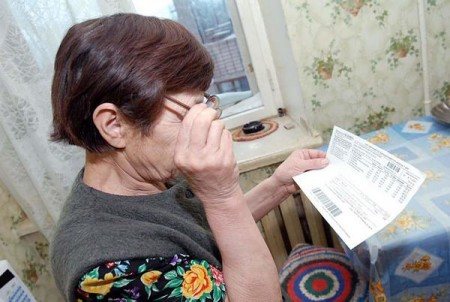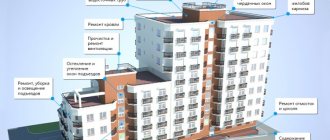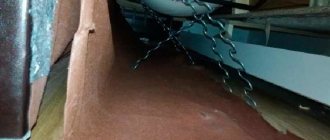The country's Housing Code provides for mandatory payment of receipts for major repairs. This is based on the fact that fundraising is included in the standard list of all documents for Housing and Communal Services. Payment must be made exactly on time, before the 20th day of the month following the month of payment. Otherwise, if there is no payment, penalties will begin to accrue, which will only continue to grow.
If payment is constantly ignored and receipts remain unfulfilled, then everything may be resolved in court and not in your favor. In addition to the receipt itself, you will have to pay all legal costs.
Of course, no one can evict you for this. But other restrictions may be introduced for the owner and residents. One of these may be restrictions on traveling outside the country. Even if major repairs have already been carried out, then contributions still need to be paid in the future. All these funds will also accumulate in accounts and will be spent if necessary.
As for the change of owner, which most often occurs when an apartment is sold, donated or transferred into ownership of the apartment by inheritance, the new owner also acquires the obligation to pay current contributions for major repairs. Moreover, if there is a debt that has arisen, then he will be obliged to pay for it and pay it off altogether.
No one has the right to demand from a person who is a tenant of a residential premises payment for major repairs. This responsibility rests only with the owner. This also applies in the case of privatized housing, rental housing, and even living in a service or municipal apartment. In the latter case, the owner also pays contributions for major repairs. Therefore, you should immediately know that this payment is not included in the main list of utility bills.
Consequences of not paying
If the owner does not pay utility bills, as well as contributions for major repairs, then he may face various sanctions from the management company. To begin with, you will constantly receive mailings that will indicate the need to make payment. In addition, while you think, interest will constantly drip on the amount of debt. And these percentages will constantly grow. But if even here you do not make payment, then the representative of the management company will have to contact the judicial authorities. You will be required to provide evidence that you really could not make the payment, that is, good reasons, valid reasons. If there are none, then in addition to the debt you will also have to pay court costs.
Exemption from contributions
There are cases and times when owners are exempt from contributions for major repairs, which are mandatory. This applies to houses that are officially recognized as unsafe or subject to demolition. In addition, residents of an apartment building, which is located on land, a plot of land that is seized for municipal or state needs. Decisions may also be made on specific residential premises that are being seized. In these cases, no one will require you to pay contributions for major repairs.
But the exemption is carried out only from the next month, which follows the decision to recognize the house or land plot on which the apartment building is located.
It is also worth noting that if the land plot under the house is seized, the owners have the right to demand payment of the funds that have accumulated in the accounts for major repairs. This is even provided for at the legislative level, namely in the Housing Code.
Regions can also additionally set a period during which residents of new houses after moving in may not pay the receipt. This is done for the reason that there is no need for major repairs. But the period cannot be more than five years from the date of putting the house into operation.
Minimum payment for major repairs
In each region, the cost of contributions per 1 square meter is set independently, but the law provides for the possibility of raising prices. House residents can vote for a higher rate to get renovations started faster or to include additional features.
On average, contributions for major repairs by region per 1 sq. m is 6 rubles. But in Moscow the price for 1 meter is set at 15 rubles. In other cities, prices are often set too low - up to 3 rubles. This approach leads to the accumulation of a very small amount each year, which is enough to repair only a few houses. Therefore, many buildings can wait decades for their turn.
about the author
Klavdiya Treskova - higher education with qualification “Economist”, with specializations “Economics and Management” and “Computer Technologies” at PSU. She worked in a bank in positions from operator to acting. Head of the Department for servicing private and corporate clients. Every year she successfully passed certifications, education and training in banking services. Total work experience in the bank is more than 15 years. [email protected]
Is this article useful? Not really
Help us find out how much this article helped you. If something is missing or the information is not accurate, please report it below in the comments or write to us by email
Payment benefits

Elderly apartment owners can take advantage of the benefits. There are also changes to the Housing Code, which came into force on January 1, 2021, on the basis of which local authorities can decide to exempt a person from paying contributions for major repairs if his age is over 80 years old and he does not work anywhere. In addition, a fifty percent discount is provided for persons over 70 years of age, if they also do not work anywhere. In this case, the owners must be single. The effect of this law began to spread from the territory of Moscow to other regions of the country.
There is also compensation for the costs of major repairs. This includes the following categories of citizens:
- Citizens who are dependent on disabled children (if he has not reached the age of majority);
- Disabled children;
- Persons with the first or second disability group.
They can get back up to fifty percent of the amount they pay monthly in premiums. They may think about whether to pay for major repairs if some of the funds will be returned to them.
Among those who can receive certain “indulgences” when paying for capital repair services are families in which there are at least three children, families in which there are military personnel, as well as families in which a military personnel has died. Participants and veterans of the Great Patriotic War (home front workers, spouses of veterans) can also enjoy reduced payment rates. In addition, families who have lost their breadwinner, those with the title “honorary donor”, and persons awarded “For the Defense of Moscow” are also highlighted here.
In addition to lowering contributions, they can be withdrawn altogether. Everything will depend on local authorities, who will make a specific decision based on certain circumstances that need to be paid special attention to.
Parties
The parties play an important role in this agreement on the formation of a capital repair fund. In fact, it is they who make the decision to conclude this document.
The party initiating the agreement is the owners of the premises in the apartment building. This decision should be made some time after the apartment building is commissioned. Usually, to resolve this issue, a general meeting of owners of residential and non-residential premises is convened and the organization that will be the fund is determined by voting. It can be either commercial or non-profit.
The second party to the contract is the selected organization. If we talk about a government body, then this is a regional operator that acts on behalf of the state and assumes the responsibility to store finances and spend them only after residents submit the appropriate application and draw up an estimate for major repairs.
If we are talking about a non-governmental organization, then any commercial organization, for example, a bank, can act as a fund.
Until the owners have chosen an organization responsible for storing funds for major repairs, then, in accordance with Article 181 of the Housing Code, until an agreement has been drawn up, the residents themselves are responsible for collecting funds.
What do they save on?
Capital repair funds can be formed not only from funds received as contributions from residents. There may be other sources, funds from which will be spent for one purpose - the restoration and repair of necessary structures. This may also include funds received from the activities of housing cooperatives, apartment owner associations, as well as management companies. They can be used not only as contributions, but also for routine repairs. If we take the activities for which funds are received, then we mainly single out the rental of premises that are not residential, but which are in common ownership. The area of the house can also be used for advertising products (posters, banners, other structures). They are mainly placed on the facades of buildings and roofs of apartment buildings. But here a lot will depend on where exactly the house is located. The more advantageous the location, the more funds can be collected and received. In certain situations, they will be sufficient to cover all required contributions.
When and how is the document concluded?
The agreement is concluded only if each of the owners of the premises agrees to it. The majority principle applies. The draft agreement is submitted by the organization that the owners contacted, and the decision to sign the agreement is made at a general meeting of residents.
An agreement with the capital repair fund must be concluded after the delivery of the house, or upon refusal of the services of one organization and contacting another.
Can the owner refuse to enter into a contract? The owners may be reluctant to enter into an agreement with a regional operator and a banking structure, but in this case, in accordance with Article 181, it is the owners who will be responsible for maintaining the house and carrying out global repair work in it.
Apartment building renovation program
In addition to contributions for the overhaul of an apartment building, there are also government programs that allocate funds for the current and major restoration of the building. But there are some nuances that are worth considering.
The municipality sets deadlines for when it will be necessary to carry out major repairs of a particular house. But even if a schedule is drawn up, it will not always correspond to reality. There are even cases where there are houses nearby that require significant repairs. If in the first it is needed much faster than the second, but according to the schedule the difference is noticeable. In certain situations, you will have to wait 20 years for the first apartment building, and 5-7 years for the second. Everything will depend on the decision made by local authorities.
You can also make your wishes regarding the order of major repairs. But this is already a kind of appeal against the decision. It will be enough to write a competent application, which is submitted in any way to the department. After this, a commission is created that will make the final decision. If they determine that a faster repair will be required, adjustments will be made to the existing schedule.
Major repairs cannot be carried out at a later date than those provided for in the schedule. Only on the contrary, it can be done earlier. But this often happens if the owners of apartments in the building independently raise funds for this. They already determine the time for performing all types of work.
At the same time, the quality must remain at a decent level. To check it, a commission is created, which ultimately accepts the entire scope of work. In addition to representatives of the organization, it also includes residents of an apartment building that was undergoing major renovations. This is done for correct assessment.
There may be cases when the entire scope of work has been accepted, but over time, shortcomings have appeared, for example, the roof has begun to leak. In this case, only residents of the house can challenge the decision. The construction organization is obliged to make the necessary repairs.
All established tariffs come from local authorities. They have the right to adjust it in the necessary direction, as well as change it if necessary. But you must pay, since otherwise a penalty will be charged in the amount of 1/300 of the refinancing rate of the Central Bank of the Russian Federation.
The need to pay for major repairs to residents of new buildings
Article 170 of the Housing Code of the Russian Federation, paragraph 5.1, establishes the procedure for paying funds for major repairs for residents of new buildings. According to this clause, owners of apartments in houses built after the advent of the program for payments for major repairs begin to make contributions only after a certain period.

For a maximum of 5 years, the building is under the developer's guarantee, and he must carry out repair work. But this period is determined individually for each building in different regions. Typically this period is only 12 months. After the warranty period expires, owners begin to receive receipts for payment for major repairs.
Legality of contributions

Some apartment owners may consider that the entire volume of work on major repairs of buildings and structures should be carried out by the state. But in reality everything is somewhat different. Since contributions are provided for at the legislative level, their payment is simply necessary. They are mandatory specifically for apartment owners. This paragraph is provided for in Article 158 of the country’s Housing Code.
Deputies even expressed the view that it was not entirely correct to require contributions, since a certain category of citizens, due to death or sale, may not wait in line. But this also has its consolidation. After the change of owner, all contributions are transferred to him, that is, he will wait for the established queue. The “common piggy bank” is quite legal, but the main thing is to objectively assess the condition of apartment buildings in order to correctly set the period after which repairs must be carried out.
There is no violation of the country's Constitution here. After all, the Housing Code states that residents are required to pay monthly fees. This in turn suggests that they are all equally involved in the “restoration” of the building. That is, everything is equally valuable and distributed among all owners of apartments in an apartment building. The funds created for capital repairs do not in any way contradict the Constitution of the Russian Federation. The Constitutional Court also indicated this in response to a request from deputies who tried to protect the interests of citizens. In addition, they noted that the right of ownership is accompanied by another very important right - care for common property (apartment building, its appearance).
Thus, it is necessary to pay for major repairs if there is no desire to collect penalties and debts. You can only be relieved of this obligation by certain circumstances that are regulated by law. The most important thing here is to be sure that the funds will be spent purposefully and not on third-party provision of services. It is very profitable to create your own fund by opening an account for a specific apartment building. In this case, major repairs can even be carried out within a different time frame from the local administration’s schedule. But the created schedule can be easily challenged if you present compelling reasons for carrying out repairs to the building itself, as well as all installed engineering structures.
Save
Save
What happens if you don’t pay for major repairs?
What happens if you don’t pay for major repairs of an apartment building? This is the question asked by most opponents of the new line on the receipt. In October 2014, Federal Law No. 271-FZ dated December 25, 2012 came into force. According to this law, payments for major repairs are mandatory and can only be challenged through the courts. The organization that collects contributions will sooner or later still sue you for repayment of debts. In this case, you will also be charged court costs and attorney fees. Therefore, it is necessary to carefully weigh the arguments with which you will defend yourself. There are several categories of citizens who have the right not to pay:
- living in houses recognized as unsafe in accordance with the procedure established by law;
- those living in municipal housing;
- living in new buildings.
For others, the law is binding. In general, to understand why you need to pay, contact the management company and find out where the funds for this item should be sent first. What types of repairs does the house need urgently? If the roof of an apartment building is leaking or the sewage system is constantly clogged, it will hardly be possible to carry out repair work using the “housing repair” item, and the “housing maintenance” expense item is not intended for this at all. Most likely, most citizens do not even know that there is one problem or another in the house. Collecting contributions can improve the condition of the house in just a few years, and therefore raise the quality of living in it to a new level.









